Institutional Context
Summary
Durham University (DU) is a research-intensive, collegiate university based in North East (NE) England. Though situated substantially in Durham City, we maintain sites at Stockton and Sedgefield, and have field offices in the United States of America, India and London. Our 26 Departments cover disciplines across the Faculties of Science, Social Sciences & Health, Arts & Humanities, and Business. Although global in reputation and reach, Durham remains rooted in our region and local communities. Our strategy sets out our aim to produce and disseminate research that has a positive impact on global, national and regional challenges, and which benefits culture, society, health, the economy and the physical environment.
Institutional context
Durham University is a research-intensive, collegiate University based in Durham in North East England. Ranked 6th in the Guardian University Guide 2023 and a top 100 institution in the QS World University Rankings 2023, we directly employ over 4,000 staff and welcome over 20,000 students from around the world to our 17 colleges. We support 26 departments across our Faculties of Science, Social Science & Health, Arts & Humanities, and Business: 90% of our research was rated as world-leading or internationally excellent in REF2021, supported by a high-performing research environment. The map locates the University in County Durham and the wider North East, and shows our relationship between other NE Universities and the N8 Research Partnership, of which we are a member.
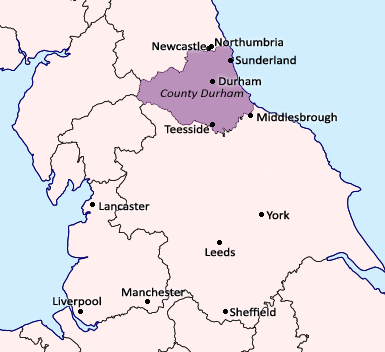
The North East has a mixed economy which includes a growing service and tourism sector. Although employment in manufacturing has declined, the importance of this sector remains more significant than in other UK regions. Deindustrialisation in the area created many challenges including low labour force participation, low business density and low levels of investment. County Durham also experiences high levels of deprivation. Data from the latest census shows the North East region has the highest proportion of deprived households in England: 54.6% of homes were classed as deprived in at least one of the four dimensions used to classify deprivation (education, employment, health, and housing) compared to the nationwide average of 51.7%.
Durham actively seeks to engage with these challenges via the Durham University Strategy 2021 - 2027, and supporting strategies and frameworks, including the Knowledge Exchange (KE) Framework. The Framework supports a holistic view of KE approaches, letting the requirements of our stakeholders and communities drive our approach.
Our approach to KE recognises that Durham can achieve more in collaboration with others. We work closely with other stakeholders across the region including Durham County Council (DCC) and other local authorities, Universities, Local Enterprise Partnerships (LEPs), community groups, cultural organisations, and businesses to identify and support projects and activities.
Durham directly invests c.GBP4M per annum in KE, engagement, and regional development projects managed by discrete teams across the University. This funding leverages significant external funding for KE including GBP17M of contract and collaborative research, GBP2M of direct regional income and GBP9M of other KE services such as consultancy and CPD. Durham invests significant resources in building strategic relationships with key partners such as Procter & Gamble and DCC that enable it to realise value across multiple areas including research and regional development.
The University is an integral part of Durham City. With a UNESCO World Heritage Site at the heart of its city centre presence, and museum and archive collections recognised as nationally and internationally significant, the University has continued Durham’s tradition as a leading cultural centre through our support for Durham’s City of Culture 2025 bid. Between 2017 and 2027, an estimated GBP900M will be invested to transform our regional provision with new buildings and estate renewal, bringing jobs and leveraging key improvements to the city’s infrastructure.
For further information, please send queries to research.policy@durham.ac.uk
Local Growth and Regeneration
Summary of approach
The North East of England faces a number of substantial socio-economic challenges, lagging most UK regions in terms of Gross Value Added (GVA), employment levels, and business start-up, growth and productivity rates.
Durham University works extensively with public and private sector partners to address these challenges, maximising its contribution to the region’s socio-economic renewal, inward investment and global reputation, as well as the creation of high-value jobs.
The University aims to build on and expand its role as an anchor partner across the regional economic growth agenda - particularly in relation to the emerging Levelling Up and regional devolution agendas (a North East Mayoral Combined Authority will be established from May 2024).
Aspect 1: Strategy
Durham University is in the North East of England, with our main campus in the heart of Durham City. The geographic areas that are strategically relevant in the context of local growth and regeneration are the city itself, the wider County of Durham, the Local Enterprise Partnership (LEP) areas of the North East (NELEP) and neighbouring Tees Valley, and the emerging North East Mayoral Combined Authority (NEMCA) area.
Extensive research, analysis and partnership development activity across the University has enabled us to develop a comprehensive understanding of the evolving economic growth agenda at a regional and national level, particularly post-Brexit. This activity, in combination with additional support from within our Research and Innovation Services (RIS) Directorate has enabled the University to successfully position itself as an anchor partner across NELEP, Durham County Council (DCC) and the emerging NEMCA local growth and regeneration strategy. The NELEP area is illustrated in the map below:
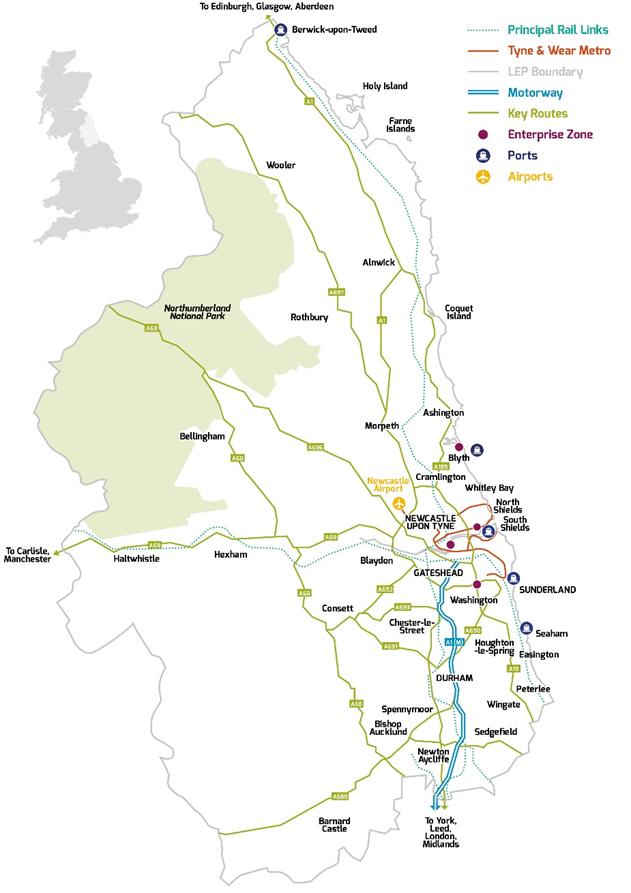
NELEP have developed the North East Strategic Economic Plan, which outlines regional economic growth and regeneration strategy and is driven by the ambition to create 100,000 more and better jobs by 2024. The University is actively engaged with the NELEP at all levels and has been supported by them in the development of key programmes of activity (see Aspect 2).
County Durham
Additionally, County Durham has a strong economic regeneration partnership led by Durham County Council (County Durham Strategy Summary) . Durham University is an active member of this partnership and has developed a number of successful projects alongside public and private sector partners. In 2022, we worked with Durham County Council (DCC) to develop an ambitious Memorandum of Understanding (MoU) which aims to strategically collaborate on delivering inclusive growth for the county.
Understanding Local Needs
Durham University has undertaken a range of activities to help identify local needs, and create an evidence-base from which to develop programmes and projects. These include:
The development of a specialist Economic Development Team within RIS to lead on the growth of activity in this area. The focus of this team is to maximise University engagement and impact across the economic development agenda within the geographic areas outlined above;
An analysis of regional innovation data and a review of successful models of support around the country to identify best-practice in local growth and regeneration within a research-intensive university environment;
Commissioning external consultancy support to establish needs and best approaches in key areas, for example scoping partnership possibilities for the Centre for Health Data;
Acting as academic lead on the Science and Innovation Audit of the Northern Powerhouse Chemicals and Process Sector;
Developing and delivering against a range of strategically important MoUs, including with Durham County Council and the Centre for Process Innovation (CPI)
Collaborating with other regional universities to develop large scale strategic programmes that can support the region to level up, for example through our leadership of the Northern Accelerator programme, and through the Intensive Industrial Innovation Programme (IIIP).These programmes are described in Aspect 2.
Being active partners with the NELEP and Tees Valley Combined Authority on the Strategic Economic Plan and Local Industrial Strategy development.
To support our ambitions across the local growth agenda, we have accessed a range of regional and national funding sources including European Regional Development Funding (ERDF), NELEP, Regional Growth Funding (RGF) and Research England. This has been vital in supporting delivery of our local growth and regeneration outcomes, for example through our University Enterprise Zone at our Orbit site in Sedgefield . More recently, with the ending of ERDF support, we have worked with Durham County Council, NELEP and the North of Tyne Combined Authority to develop a range of innovation and economic growth focused projects via UK Shared Prosperity Fund (UKSPF) finance.
Strategic Approach
Durham University’s Strategy (2017 – 2027) includes a commitment to produce and disseminate research that has a positive impact on global, national and regional challenges and which benefits culture, society, health, the economy and the physical environment. With this as a driver, the Knowledge Exchange Strategy Framework 2022 – 2026 was created. Two key pillars of this framework are Place and Economic Development, and Commercialisation and Enterprise, as illustrated below:
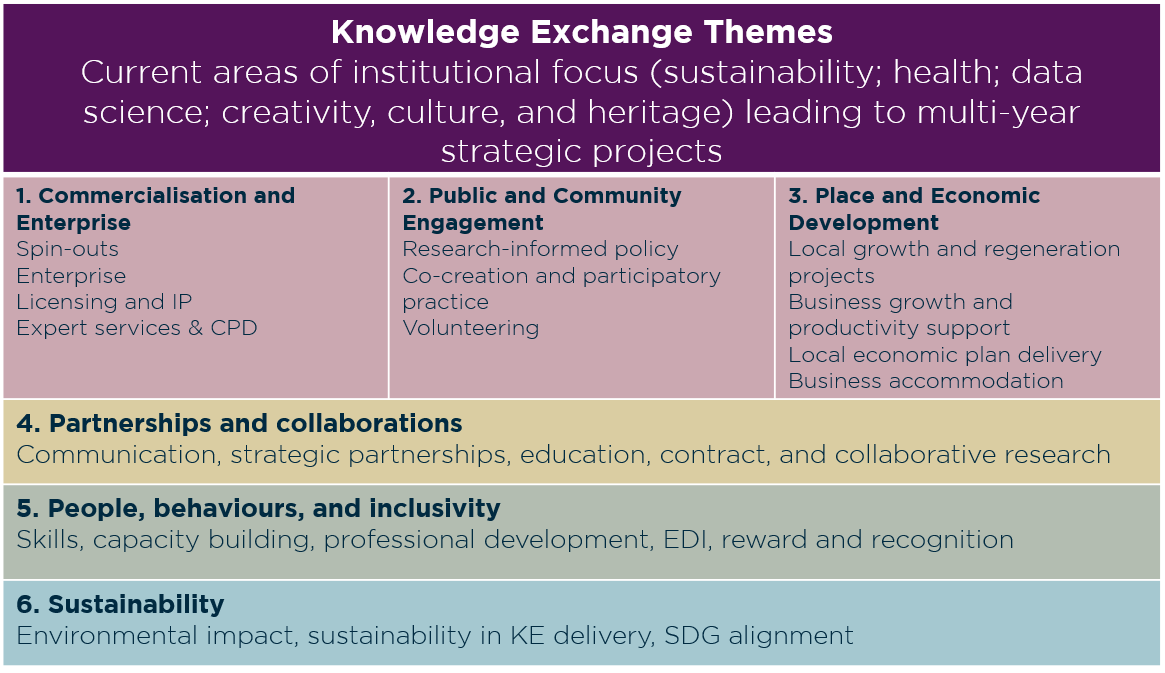
We have also developed an Enterprise Implementation Plan to help operationalise the delivery of our objectives.
Aspect 2: Activity
In order to maximise engagement across the economic growth agenda, we have specifically recruited an Economic Development Team within our RIS Directorate to support the University ambition in this space, and have used Higher Education Innovation Fund (HEIF) resource to add specialist posts elsewhere to augment this, e.g. in our enterprise and commercialisation function. We have boosted central support with dedicated post-award and compliance posts, as well as externally funding a number of project managers and administrators across programmes as they secure funding. This has enabled Durham University to take a leadership role regionally in developing and delivering key economic growth programmes (see Aspect 1).
The University has developed and delivered significant programmes of support for knowledge exchange, innovation, business growth and entrepreneurship over this period. These programmes meet identified local needs through responding to specific targeted funding calls and working collaboratively during development with key local policy bodies such as the NELEP and DCC in the way we describe in Aspect 1.
Key areas of University engagement across this agenda are set out below.
Start-up and spin-out activity
The University encourages student entrepreneurship and supports regional SME start-up and growth through a number of public / private sector partnership projects.
Northern Accelerator is a landmark regional programme developed and led by Durham University in partnership with Newcastle, Northumbria, Teesside, York and Sunderland Universities to support and enhance spin-out creation, and led to the long-term establishment of a dedicated Venture Capital fund. The region suffers with low levels of business start-ups, which Northern Accelerator is helping to combat through dedicated support to spin-out creation.
The support on offer ranges from ideas generation support, executives into business, proof of concept funding, innovation assessments and seed capital investments. Early indicators show that this approach is successful as spin-out start up rates have tripled after the first full year of operations.
The Northern Accelerator launched its GBP1.8M Seed Investment Fund in August 2020. This investment fund is jointly owned by Durham, Newcastle, Northumbria, and Sunderland universities, and is managed by Northstar Ventures. The fund was fully invested by the end of June 2021, investing in three Durham spinouts and attracting GBP4.47M co-investment.
The University has boosted enterprise support for students enabling more students to receive an in-depth experience of entrepreneurship and new business start-up. This includes support for the Durham City Incubator in partnership with Durham County Council and New College Durham, allowing new businesses to access a range of detailed support as they start out. This programme supports the region’s ambition for more start-ups particularly those in high growth sectors that will create better jobs.
Developing the innovation ecosystem
The Intensive Industrial Innovation Programme (IIIP) supports industrial PhDs with local businesses across the North East and Tees Valley LEP areas in collaboration with Teesside, Newcastle and Northumbria universities. The project, led by Durham University, has supported over 50 PhDs in key growth sectors to date and accessed further financial support for a phase 3 delivery. The project strongly supports the 2.4% research and development target and business growth objectives for SMEs in the region, enabling them to research new products / services that are then able to be commercialised.
The very close working relationship with Durham County Council has continued with the launch in April 2022 of an ambitious MoU that embodies the overarching principles of inclusivity, diversity, and inclusive economic growth. As part of this collaboration, we continue to support the development of the 50 hectares, 6,000 job Aykley Heads business case for investment in the Durham city area, as well as supporting roll out of phase 3 of the NetPark Science Park. Associated with these ambitious high growth opportunities, additional work has also been undertaken on the development of business cases for a National Centre for Geothermal Energy and a Centre of Health Data, both to be potentially located at Aykley Heads.
The Orbit University Enterprise Zone, launched in June 2021, has firmly established its role as a key interface between the business community and the University. With more than 80% of the facility occupied, Orbit is positioned as a vibrant hub for business innovation with significant economic outputs for County Durham as well as directly supporting the growth of the North East digital, technological and science industry cluster.
Collaborative Partnerships & Open Innovation
Procter & Gamble are the University’s largest industrial strategic partnership, and our approach is noted as an exemplar of university-business collaboration within the sector. We have a strategic master agreement in place and have developed a strong partnership base for building collaborative research (c. GBP1M income per annum). Procter & Gamble are also a close partner in several of our strategic economic development programmes.
Our innovation partnership with Atom Bank, the Durham-based high growth challenger bank, has continued to help us maximise long-term funding leverage into regional joint-venture projects with high impact and high returns. Examples of outcomes include a GBP600k project funded by Innovate UK to assess use of blockchain, verifiable credentials, decision trees and crypto statistics to mortgage originations and credit risk modelling in collaboration with Newcastle University.
We have a strategic MoU in place with CPI which has enabled two successful economic regeneration programmes to be run in partnership focussing on our complementary research and commercialisation strengths. We actively and regularly engage with CPI to identify new ways of working collaboratively in the future and they are a key partner in university strategic project development.
Two programmes for regional SMEs run in collaboration with CPI deliver support in key sectors where we have research expertise. COAST allowed businesses to access post-doctoral and laboratory facilities in the field of nanotechnology enabling new product testing and Spotlight provides similar support for research in health photonics.
Finally, the Water Hub supported innovation in the water sector in partnership with Durham County Council, the Environment Agency and Northumbrian Water Ltd through innovation challenges, mentoring, grants and access to local test beds.
Aspect 3: Results
The broad portfolio of University led economic development activity has added significantly to the continuing economic growth and regeneration of the region and its businesses. As our project portfolio develops, we constantly seek to refine projects on the basis of partner feedback, evolving regional strategy, independent project evaluations and team experience.
We have made considerable progress against our institutional Enterprise Implementation Plan (see Aspect 1), including:
A 28% increase in the number of unique students engaged by the Careers and Enterprise Team in enterprise training (982 in 2021/22, 770 in 2020/21)
An increase in start-up investment over 4 years, increasing from GBP6.6M in 2020/21 to GBP15.1M in 2021/22, which employ 106 individuals (up from 75 in 2020/21), representing significant growth on both KPIs.
A 62% increase in number of new start-ups created (34 in 2021/22, up from 21 in 2020/21)
The launch of a new Venture Creation programme, Durham Venture School (DVS). This led to the formation of 11 new companies and cohort members rated the programme 9.3 out of 10 at the end of the 6 months.
Our Game Changer programme: innovation challenges themed on the United Nations’ Sustainable Development Goals, was selected as one of the top 21 projects globally (from over 700 nominations) to feature in the United Nations’ SDG Good Practices publication.
Low Carbon Materials (LCM) is a postgraduate-led spin-out from the University that is developing its zero-carbon aggregate concrete block, made from plastic waste. The company was supported by the Northern Accelerator programme (see Aspect 2) and attended COP26 in November 2021 to highlight the need for low carbon solutions in the construction industry. They also secured over GBP1.9M investment funding and were nominated for the Earth Shot Prize in 2022.
A Durham University led business internship programme (DICE) developed jointly with DCC provided an integrated package of SME start-up and growth support to County Durham SMEs. To date, the project has supported more than 50 SMEs, creating 48 new jobs and enabling 10 enterprises to introduce new to market products. A report from BiGGAR Economics estimated the University contributed GBP38M GVA and supported 690 jobs in the North East regional innovation eco-system.
This infographic below illustrates our economic impact in the period 2020/21:
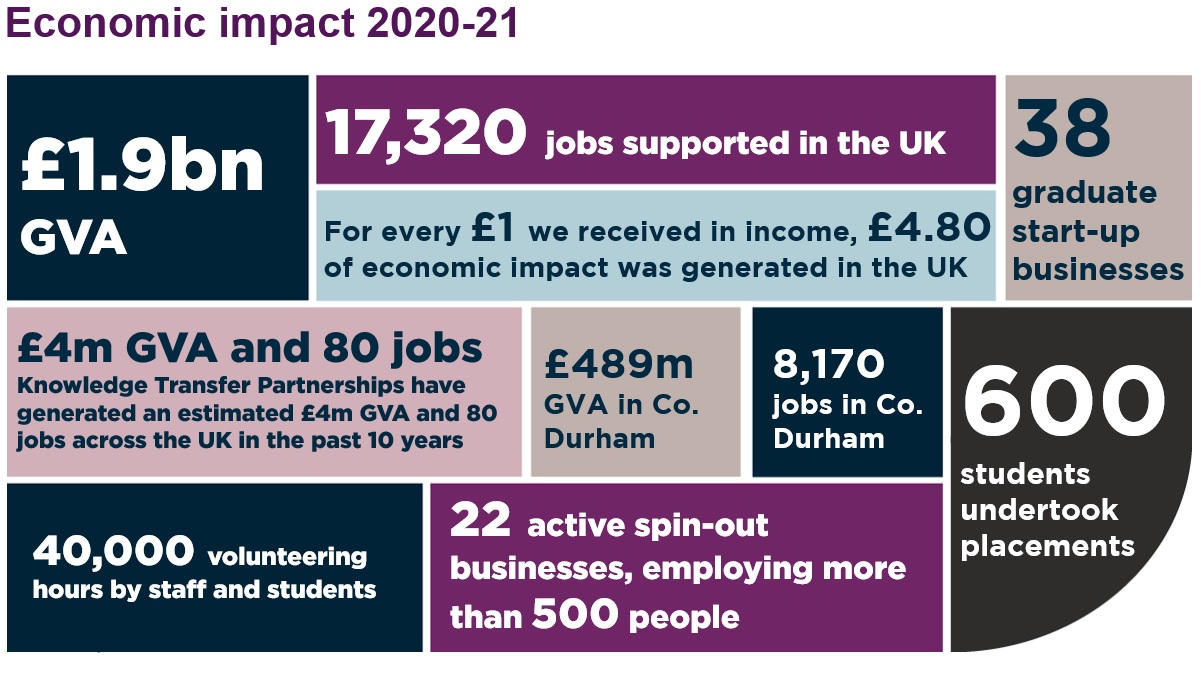
We communicate programmes and success via a range of social media channels and locally through the media as appropriate. We have the benefit of a dedicated Partnerships & Engagement Communications Officer as well as a marketing manager within the Northern Accelerator project. Our increasing involvement in economic development initiatives across the region has led to a range of communication opportunities alongside partners.
The ending of ERDF support to regional economic development and delays in the launch of the replacement Shared Prosperity Funding (SPF) has led to challenges to the continued expansion of economic growth activity during the period under review. This is starting to be addressed during 2022/23 as SPF comes onstream and a devolution deal for the North East develops.
Public & Community Engagement
Summary of approach
Durham University’s approach to Public & Community Engagement (P&CE) is set out in the
Durham University Strategy (2017 – 2027). We aim to produce and disseminate research that has a positive impact on global, national and regional challenges, and which benefits culture, society, health, the economy and the physical environment. Support for engagement is embedded in our values, led and championed by senior staff, and enabled through targeted use of financial and staff resources, and responds to the needs of our local and regional communities through stakeholder consultation, co-produced activities, and investment in participatory research.Aspect 1: Strategy
Durham University has embedded its commitment to public and community engagement (P&CE) in its core values, as reflected in our Responsible University Statement and Durham University’s Strategy (2017 – 2027), which outline our aim to be a socially responsible institution that contributes effectively to economic and social development of its communities. It highlights our emphasis on partnerships with social enterprises and public sector organisations that: facilitate translation of knowledge and understanding for wider public benefit; promote volunteering and community engagement; and stimulate sustainable initiatives for the benefit of future generations.
Two core drivers encapsulate our approach:
As a world leading research institution, our P&CE should, wherever possible, be informed, supported by, and act to enhance our teaching and research, including through collaboration and the co-production of knowledge;
As a responsible stakeholder in the local and regional community, we have a responsibility to support and enable a vibrant P&CE ecosystem.
Our commitment to purposeful, meaningful P&CE is therefore a core element of the policies and strategies that underpin activities across the University’s academic and professional support functions.
One such strategy is the Knowledge Exchange Strategy Framework 2022 – 2026. Created in 2021 in response to the opportunities for improvement highlighted by the first iteration of the KEF, the Framework recognises the central importance of KE as part of our core purpose and role, and sets out a vision to use the knowledge and capabilities of our academics, professional support staff, students, and communities to transform lives through societal, environmental and economic change. P&CE is one of three central pillars driving KE activity:
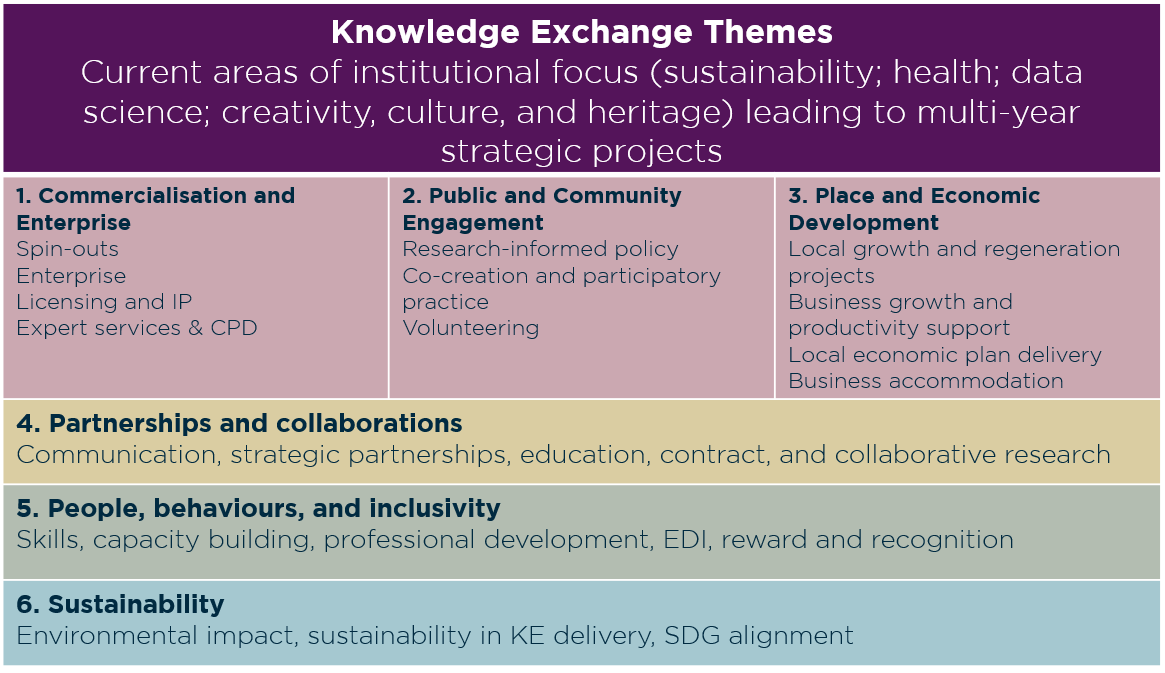
We recognise that a positive research culture is critical to embedding excellence in P&CE. In response, the Flourish@Durham project was initiated in October 2021, aiming to ensure the best environment possible for all involved in research at Durham, and to make research fun, fulfilling, and fruitful for our communities. The actions that underpin the project, developed after consultation with key stakeholders, are built around four themes:
Creating the best environment for all to flourish
Ambitious in our research and positive in our culture
Respectful of everyone's role and investing in our community
Enabling structures that encourage collaboration and openness
Flourish@Durham is a priority programme for the University, and will itself support innovation, engagement, and inclusion for Durham’s communities through its ongoing activities.
Rooted in our strengths, growing for the future
Durham roots its approach to P&CE in its unique strengths. REF2021 rated 90% of our research as world-leading or internationally excellent, while our Library and Heritage Collections team cares for 4 specially designated collections. The outstanding collections are recognised by the Designation Scheme, which recognises their significance, and helps increase access: such public access is a core element of Durham’s cultural engagement programme.
Durham also recognises that research strengths grow and develop over time, just as communities do. In 2022, Durham undertook a review of its research strategy. It placed a greater emphasis on P&CE activity, recognising particularly the role of culture and heritage and the partnerships we grow with local authorities, the NHS, regional LEPs, and other HEIs, and seeks to better articulate, develop, and support key elements of research engagement and impact in a refreshed strategy from 2023 – 2027. Civic engagement will be a cross-cutting theme supporting all areas of University activity and will itself be supported by a separate Civic and Regional Engagement Strategy to be implemented in 2023.
Aspect 2: Support
Durham’s strategic approach is underpinned by a distributed, pan-institutional infrastructure that supports the delivery of our aims.
At the most senior level, our Vice-Chancellor and Warden Professor Karen O'Brien has led Durham’s commitment as a university that is responsive to the needs of its communities. Speaking shortly after taking up the role in January 2022, she said:
Durham University is proud to have worked with partners across the North East of England for nearly 200 years to drive investment, innovation, job creation and development, and the adaptation of our economy for the challenges that lie ahead. We are actively engaged with our local communities to tackle inequalities and embrace new opportunities through our impactful research, innovation and investment to transform lives for the better.
To ensure the needs of our community help drive P&CE activity, Durham established several stakeholder groups to facilitate engagement and bilateral communication. The Community Engagement Task Force (CETF) involves Durham residents, local stakeholders, University staff and students, working together help to identify priorities for Durham’s work with the wider community and progress activities on jointly identified projects. Our Library and Collections team work with key cultural stakeholders in the region to provide opportunities and community access through museums and outreach initiatives, while our Volunteering at Durham team co-ordinates community-focussed, student-led projects throughout the region. The infographic below gives more information about participation in the programme in 2021/22:
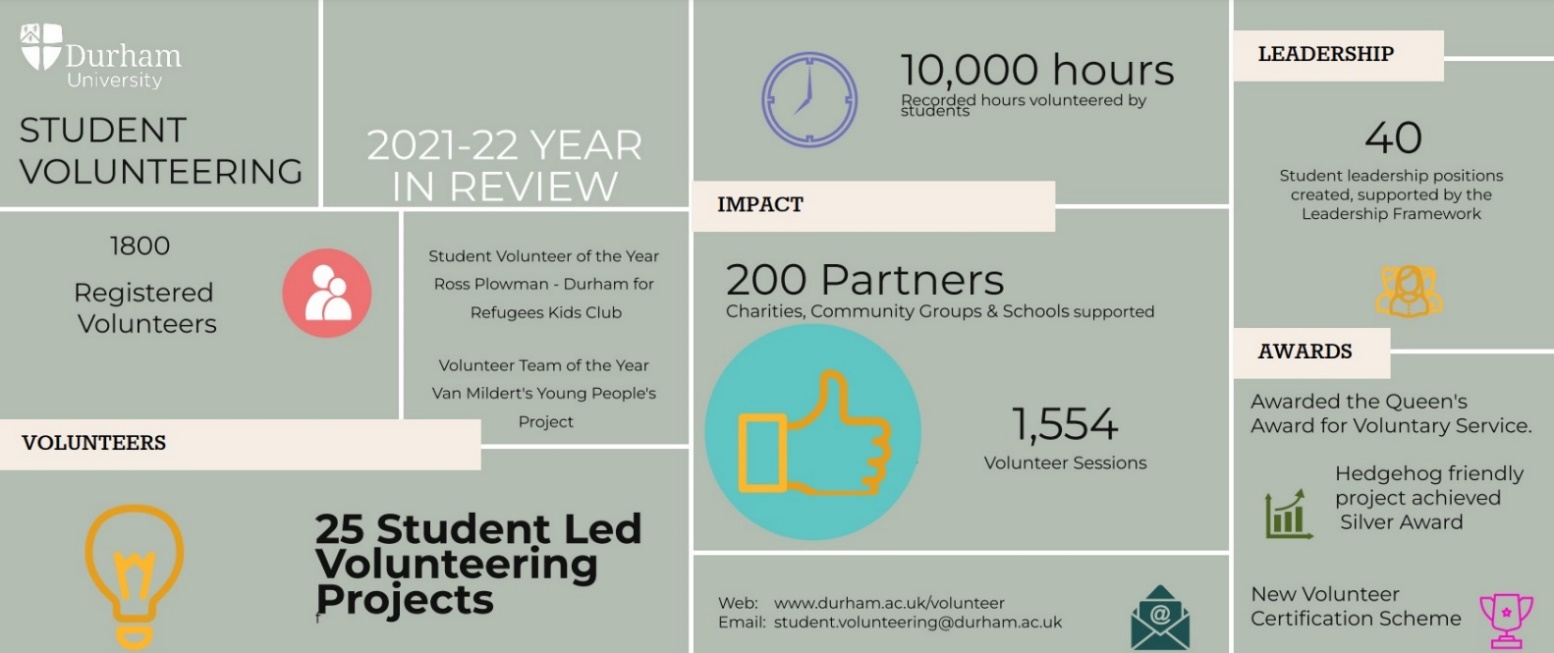
P&CE activity is supported by specialist professional staff across the University. For example, our Partnerships and Engagement Team in Research Innovation Services advise and assist on the development of best-practice research impact and engagement; our Science Outreach team works with communities, industry partners and hundreds of schools across the region to deliver high-quality science outreach activities that build on Durham's research and teaching strengths in science; while our Library and Heritage Collections colleagues innovate to facilitate our communities to access and engage with our museums, archives, and special collections, including through our schools programme. In addition to offering practical advice, the teams also deliver training and development for academic and professional colleagues, with 385 people attending over 20 sessions in the assessment period.
Our teams also develop and manage funding to support P&CE activity. In addition to supporting inclusion in research grant applications, Durham uses a portion of its HEIF funding to operate the competitive Research Impact Fund (RIF), which resources research-led impact and engagement activity across the institution. Durham has also been successful in securing the following UKRI Impact Accelerator Accounts (IAAs), which award funding to research-led programmes of impact and engagement for the KEF assessment period:
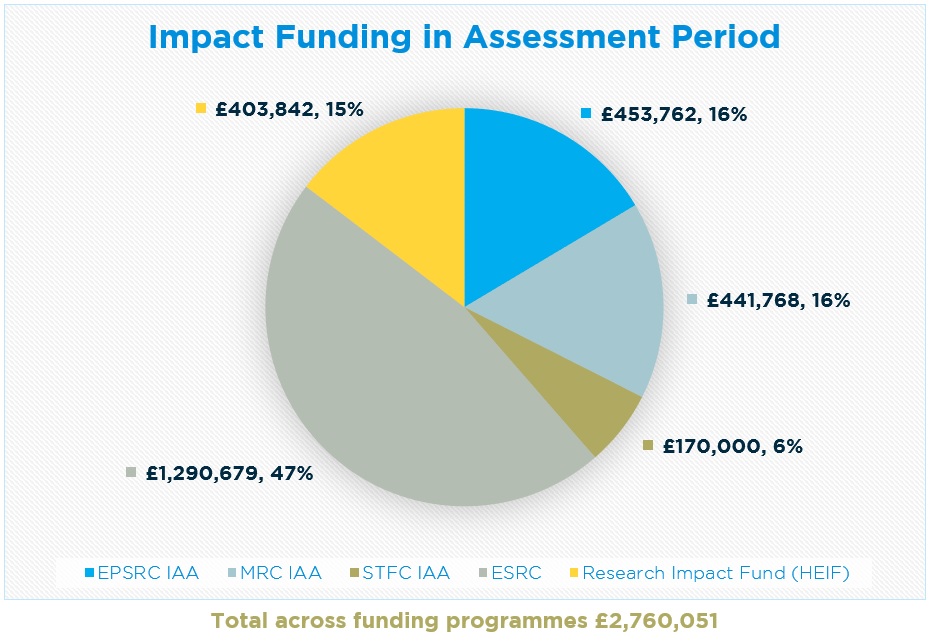
Durham has also used Research England’s Participatory Research Fund (PRF) to catalyse innovation in our P&CE work. In 2022, we established Innovation and Learning Labs through our Centre for Social Justice and Community Action to explore the challenges and opportunities of engaging our local communities in our research. Over 5 workshops, 138 participants (41% from the community; 59% academic and professional support staff) collaborated on potential new approaches, which will inform future projects. More details about the work of the Centre, as well as our wider community-engaged research streams, is available via our dedicated webpages.
We recognise that it is important to reward and recognise the successes of people who engage in our P&CE activities. Internally, impact and engagement remains a part of academic promotion pathways. We also ensure that outstanding people and projects are nominated for external awards where appropriate (see Aspect 3).
Aspect 3: Activity
The last three years of activity encompass a period of great challenge for P&CE activity. The Covid-19 pandemic, international conflict, and economic crises have impacted both ability and capacity for P&CE initiatives. Though disruptive, these circumstances have encouraged innovation, and Durham’s key programmes of activity reflect how we have built on existing strengths to generate new approaches, while maintaining development for priority areas. Exemplar activities include:
Street Gallery and Street Museum
The Street Gallery project was piloted 2020 when Covid-19 restrictions curtailed opportunities for communities to come together. Working in collaboration with grass-roots arts organisation East Durham Creates and households in Dawdon, County Durham; with funding from Arts Council England’s Let’s Create Covid-19 Response Fund, Durham University, and sponsorship from Digitalab, the aim was to find volunteer households to display art in their windows, making it accessible within Covid-19 restrictions. Street Museum built on that success by working in the village of Blackhall Colliery in east County Durham between 2021/22 to transform the streets of low engagement neighbourhoods into co-created museums, collaborating with community members to co-curate exhibitions. Building on Durham’s strengths in research and using our unique collections, 3D scans and prints of Durham’s museum objects were created and displayed in volunteer homes and businesses as part of a village-wide exhibition.
P&CE was the central pillar of this knowledge exchange project. To quote one community member, "the Street Museum placed the village and community at the centre. It brought people together after a very difficult time [referring to the pandemic].” For one person, the project itself became a means to facilitate collaboration, observing that "Street Museum was the tool to just build a good relationship. And lo and behold, in these places, they’re all kind of human powered… it’s all about the individuals working on it, it’s not about the kind of strict processes and so building in flexibility that can respond to the individuals from all departments and organisations and ordinary people… people within the community. And that worked just beautifully."
The innovation and success of the project was recognised when Street Museum was nominated for the North East Culture Awards 2022, winning in the category Best Arts & Education Partnership Award.
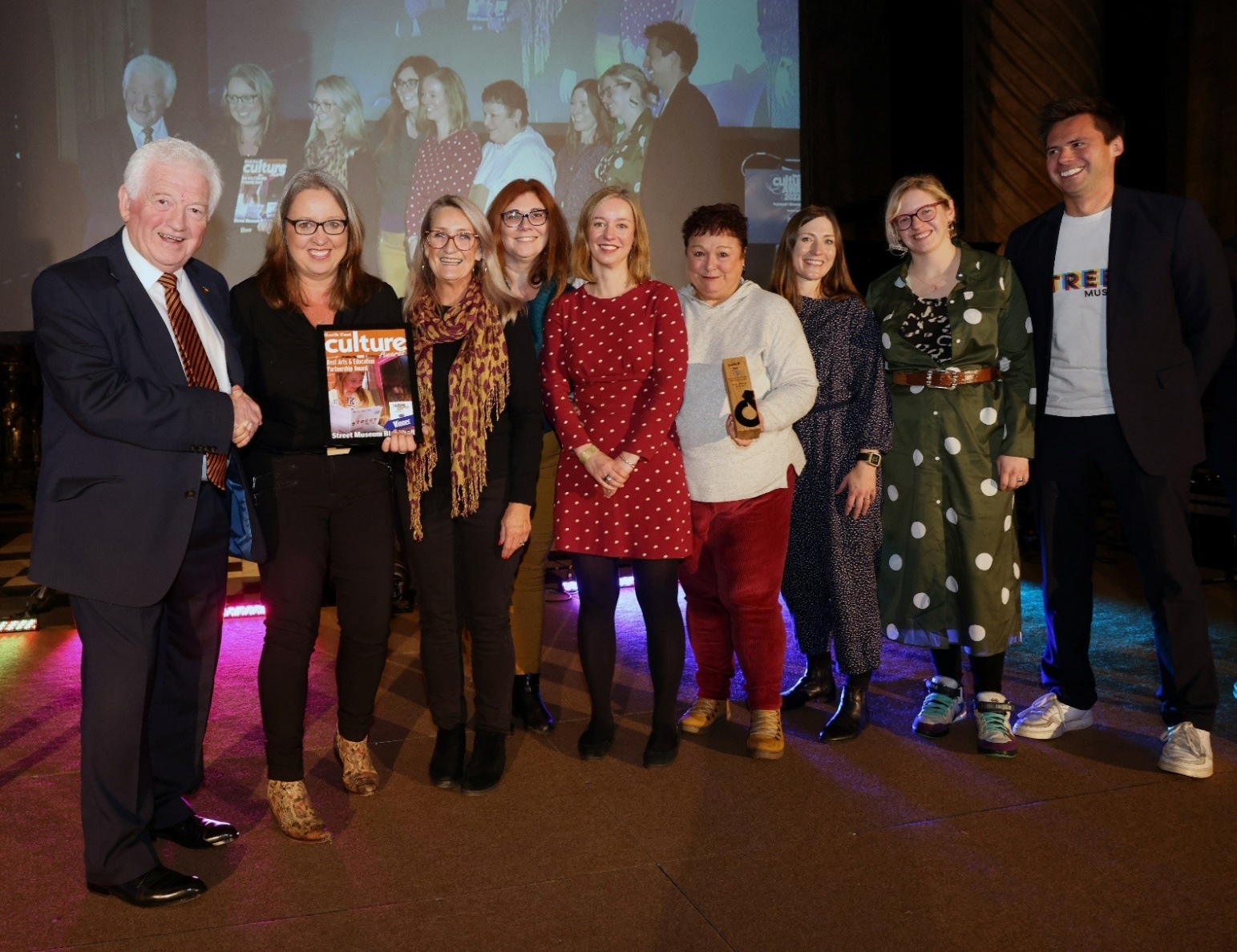
Parental Rights In Prison - Open Clasp Participatory Project
Supported by a grant from the Research England Participatory Research Fund, colleagues in the Department of Sociology (Dr Hannah King and Dr Kate O’Brien) created a ground-breaking project that used participatory theatre to undertake research in collaboration with mothers in prisons to assess how engaging in drama methodologies can empower women to affect personal and systemic change. In partnership with north-east charity NEPACS and Open Clasp Theatre, and in collaboration with mothers at HMP & YOI Low Newton in County Durham, the team explored mothers’ experiences of parenting from prison, the impact of maternal rupture on them, and how this affects the effectiveness of existing support programmes. A play script was developed based on the characters and stories created by the group, and is being used alongside co-produced educational materials to influence policy-makers, prison organisations, and practitioners. The project has enhanced the evidence-base for decision-makers, improved women’s self-esteem and awareness of their legal rights in family court proceedings, and helped enhance support programmes with knowledge from lived-experience.
This project is one example of the way that Durham researchers engage collaboratively with marginalised and disenfranchised women in our local community, co-creating a change driven by lived-experience and knowledge exchange, but with resonance and relevance to women across the country.

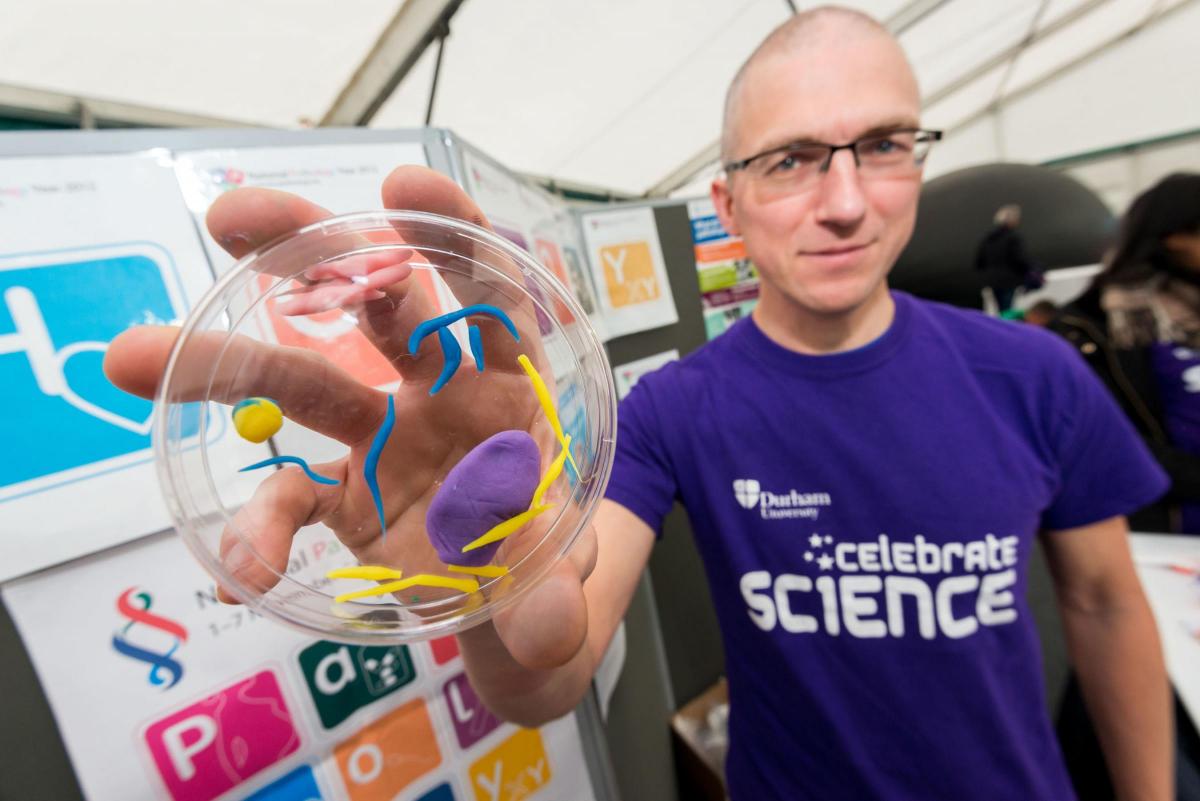

Aspect 4: Enhancing practice
The specialist support staff described in Aspect 2 offer advice and guidance on appropriate evaluation to researchers when designing projects and generating research grant applications. Evaluation expertise is costed into research grant applications, and specialist consultants are contracted where wider perspectives are beneficial. P&CE activities carried out by Library and Collections colleagues, and those working in Science Outreach, benefit from expert, sector-informed evaluation support. In 2021/22, Library colleagues recommenced work on audience analysis and development (impacted until recently by Covid-19).
The training delivered by these teams (see Aspect 2), covers evaluation in P&CE. Colleagues are encouraged to participate in CPD activities that maintain and enhance knowledge about best practice P&CE evaluation e.g. undertaking the NCCPE Engage Academy, which several Durham colleagues have completed, and attending CPD events such as those offered by the National Centre for Academic and Cultural Exchange (NCACE). The University also utilises findings from its own research to inform evaluation approaches: research generated by the AHRC-funded Creative Fuse project team has informed the initial scoping and development of evaluation activity with community arts and culture sector partners.
In the last year, and to help embed Durham as an anchor institution in the region, we intensified work with local stakeholders and partners to map current activity and establish a baseline for future evaluation. We have worked closely with Durham County Council (DCC) to improve collaboration, to develop collective approaches to the key challenges and problems facing our communities. This includes a co-funded Research Associate embedded in DCC, work with Community Action Durham to forge stronger links with community-focussed voluntary organisations, and stepping up as a key partner in County Durham’s bid for City of Culture 2025, which placed cultural collaboration and community-led activity at its heart. County Durham made it to the final shortlist, and though ultimately not successful, one of the university projects that has been carried forward in 2022 is scoping work on a new ‘evaluation hub’ that will help drive improvement on evaluation for P&CE across the organisation.
Aspect 5: Building on success
Progress towards our strategic aims, including those related to P&CE activity, are set out in a series of KPIs that are included in our annual reports, which are publicly available. However, we recognise that the institutional KPIs do not fully reflect our growing ambition to position ourselves as a civic institution, and a more robust approach that will capture qualitative as well as quantitative information will be valuable. As a first step towards this, and as result of learning from the last KEF, we have developed a CRM to help better capture both P&CE and Local Growth and Regeneration data. The system has been implemented on a trial basis in the Partnerships and Engagement Team and will be rolled out further on completion of a pilot phase. It includes the capacity to generate reports on some elements of our activities with partners, and will help embed evaluation monitoring into business improvement.
Progress against priorities in Aspect 1, those identified through work with the Community Engagement Task Force in Aspect 2, and the activity programmes exemplified in Aspect 3, is reported through our community newsletters and via our website. We also use meetings of the stakeholder groups identified in Aspect 2 to seek comments and input on progress from our communities.
Durham recognises that more work is needed on continuous improvement in P&CE. To this end, Durham’s Policy Hub carried our work in 2021/22 to enhancing Durham’s position and capabilities as a sector leader in co-produced research and generated a series of recommendations from the team’s work on participatory research (PR) initiatives, including:
Our refreshed Research Strategy should recognise the value of community-University research partnerships and particularly a commitment to co-production, with participatory research as a key driver of this.
A review of the full range of PR and co-production related training available across the University should be undertaken to identify gaps and opportunities in the current offer, including considering ways to resource any gaps.
Our policy on engagement of the public in research should be updated to include substantive reference to research which is co-produced with communities and other partners, including participatory research.
Consideration might be given where appropriate to more widely appointing members from the community and voluntary sector to appropriate committees, including research ethics committees.
The University Executive Committee endorsed these recommendations, and they will be critical in informing the development of Durham’s civic strategy.
Note You are currently viewing the latest version of this narrative statement. View the previous version as published in previous iterations of the KEF (KEF1 and KEF2)